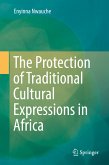Now more than ever, indigenous peoples' interests in their cultural heritage are in the spotlight. Yet, there is very little literature that comprehensively discusses how existing laws can and cannot be used to address indigenous peoples' interests. This book assesses how intangible aspects of indigenous cultural heritage (and the tangible objects that hold them) can be protected, within the realm of a broad range of existing legal orders, including intellectual property and related rights, consumer protection law, common law and equitable doctrines, and human rights. It does so by focusing on the New Zealand Maori. The book also looks to the future, analysing the long-awaited Wai 262 report, released in New Zealand by the Waitangi Tribunal in response to allegations that the government had failed in its duty to ensure that the Maori retain chieftainship over their tangible and intangible treasures, as required by the Treaty of Waitangi, signed between the Maori and the British Crown in 1840.
Dieser Download kann aus rechtlichen Gründen nur mit Rechnungsadresse in A, B, BG, CY, CZ, D, DK, EW, E, FIN, F, GR, HR, H, IRL, I, LT, L, LR, M, NL, PL, P, R, S, SLO, SK ausgeliefert werden.









